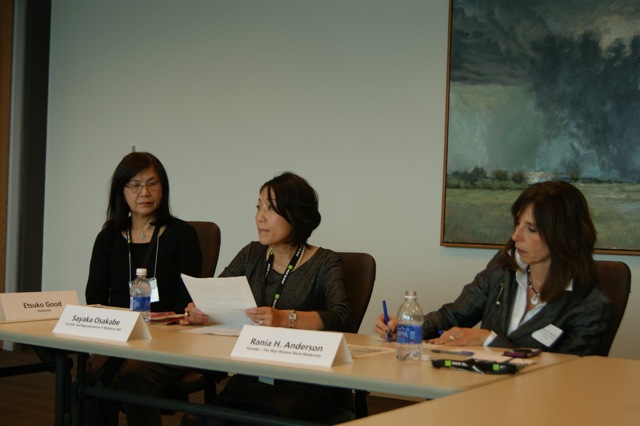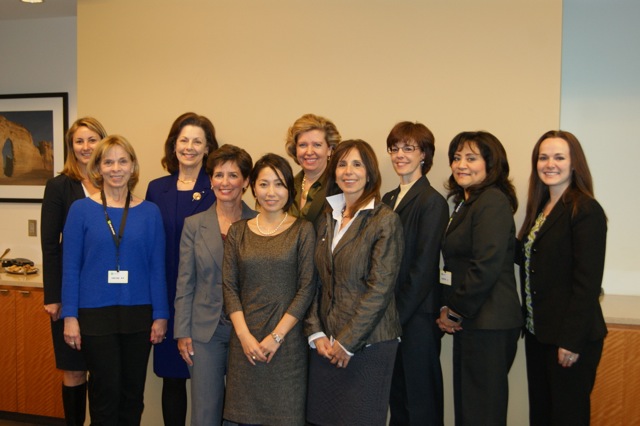The Courageous Women’s Ecosystem

Ms. Sayaka Osakabe (left) from Japan is one of this year’s International Women of Courage Award recipients for igniting a national debate in Japan about the need to reform the Japanese workplace to accommodate women and families.
A petite woman, Ms. Sayaka Osakabe packs a big punch.
From Japan, Ms. Osakabe is one of this year’s International Women of Courage awardees. We hosted her in Kansas City this week and I was struck that we regularly talk about the entrepreneurial ecosystem, but not often enough about the ecosystem needed to achieve gender parity.
 At significant risk and cost to herself, Ms. Osakabe courageously ignited a national debate in Japan about the need to reform the Japanese workplace to accommodate women and families. Like many Japanese women, she was harassed and pressured to resign from her job after becoming pregnant. After suffering two stress-related miscarriages, she pursued legal recourse for “maternity harassment” —something that actually has a name in Japanese – “Matahara.” Ms Osakabe won her case but lost her job. So, she founded Matahara Net to help other women. One of these women won the landmark Japan Supreme Court Supreme Court case in October 2014 ruling against pregnancy discrimination.
At significant risk and cost to herself, Ms. Osakabe courageously ignited a national debate in Japan about the need to reform the Japanese workplace to accommodate women and families. Like many Japanese women, she was harassed and pressured to resign from her job after becoming pregnant. After suffering two stress-related miscarriages, she pursued legal recourse for “maternity harassment” —something that actually has a name in Japanese – “Matahara.” Ms Osakabe won her case but lost her job. So, she founded Matahara Net to help other women. One of these women won the landmark Japan Supreme Court Supreme Court case in October 2014 ruling against pregnancy discrimination.
60% of Japanese women quit work after having their first child. 1 in 4 women experience maternity harassment at work.
Ms.Osakabe talked about the difficulties women face in Japan’s workplaces, sharing statistics that 60% of Japanese women quit work after having their first child and that 1 in 4 women experience maternity harassment at work. The long hours Japanese workers are expected to keep (9 a.m. to 10 or 11 p.m.) and a hostile work environment for mothers, and soon to be mothers, is one of the contributors to falling birth rates in Japan, as well as a dearth of women in management roles. According to government figures, only one in 10 managers in Japan are women, compared with 31% in Singapore, 38% in Germany and 43% in the U.S. (source: WSJ September 11, 2014). It is estimated, that by 2060, nearly 40% of the Japanese population will be over 60 years old. If Japan does not improve the workplace environment for its female population, it will continue to face low rates of economic growth and a huge labor shortage.
So how can Japan improve? Indeed, how can any number of countries who must encourage and increase the economic participation of women do so?
Our discussion with Ms. Osakabe reminds us that it is not one thing – it will take an entire ecosystem, including:
- Governmental action, policies and practices and regulations.
- Corporations creating inclusive environments and cultures where all employees can thrive.
- Businesswomen’s organizations that provide networking, business connections and training.
- Foundation and non-profits that address the health, needs, interests and rights of women.
- A society that values the inclusion and full participation of women.
- The involvement of men leading initiatives for inclusive and equal workplaces.
- Role models of successful women who integrate work into a full and fulfilling life.
As a small group of women leaders gathered to share experiences and insights about women in the workplace with Ms. Osakabe, the conversation was a great example of how the women’s ecosystem works. Gathered around the table were women leaders from a large corporation, a women’s foundation, a business women’s network, a community organization whose services and programing advances women, a health care foundation, political office and a nonprofit organization that supports and advocates for survivors of sexual abuse. Each woman shared her organization’s role as part of the ecosystem that enables our community to fully leverage the contribution of women. Ms. Osakabe was struck by the lack of comparable organizations in Japan.
We regularly talk about the entrepreneurial ecosystem, but not often enough about the ecosystem needed to achieve gender parity.
Ms.Osakabe was eager to talk about about how she could fund and expand her organization, and we helped plant seeds about what it would take to reform the Japanese workplace; all the while, acknowledging that in the U.S., we too have a long way to go, especially as it relates to maternity leave for women and the percentage of women on corporate boards and at the highest levels of organizations.
It was beautiful to see the light bulb go on for Ms. Oskabe, and watch her get taller, more confident and even more courageous right before our eyes. That’s the power of the women’s network and the courageous women’s ecosystem!
 Women leaders at event:
Women leaders at event:
Courtney Brooks, Executive Director, Global Ties KC
Cici Rojas, President/CEO of Central Exchange
Peggy Dunn, Mayor of Leawood
Aileen Wilkins, Chief People Officer at H&R Block
Rene Street, Executive Director of ABWA
Bridget McCandless, President/CEO of Healthcare Foundation of Greater KC
Julie Donelon, President of MOCSA
Cathy Dean, Senior Partner at Polsinelli and Women’s Foundation Board member
Rania H. Anderson, Founder of The Way Women Work (Moderator)